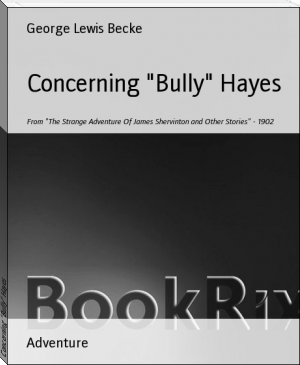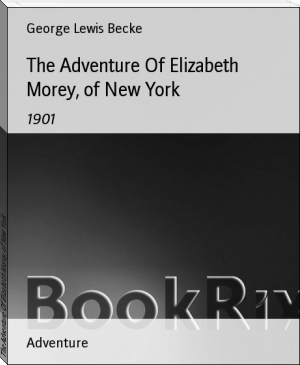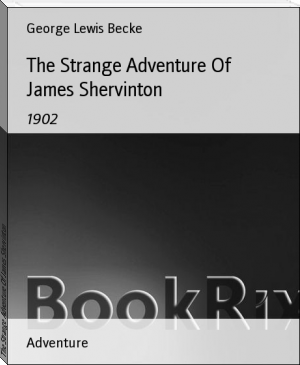Ridan The Devil And Other Stories - George Lewis Becke (free ebooks for android txt) 📗

- Author: George Lewis Becke
Book online «Ridan The Devil And Other Stories - George Lewis Becke (free ebooks for android txt) 📗». Author George Lewis Becke
'Aye,' answered the girl, softly, 'I am but a slave, and this Laea is very beautiful and the daughter of a great chief. So for that do I come to say farewell, and to ask thee to drink with me this bowl of orange juice. 'Tis all I have to offer, for I am poor and have no wedding gift to give thee; and yet with this mean offering do I for ever give thee the hot love of my heart--ay, and my life also, if thou should'st need it.'
And so, to please the girl whom he had once loved, he received from her hand the drink of orange juice, which she took from a basket she carried, and yet as he drank he looked away, for he feared to see her eyes looking into his.
Only one word did he say as he turned away, and that was 'Farewell,' and Milli answered 'Farewell, Narue;' but when he had gone some distance she followed him and sobbed softly to herself.
And soon, as Narue walked, his body swayed to and fro and his feet struck the roots of the trees that grew out through the soil along the path. Then Milli, running swiftly up, caught him as he fell, and laid his head upon her knees. His eyes were closed and his skin dead to her touch.
Presently the bushes near by parted, and two women came out, and lifting Narue between them, they carried the young man to a shady place and laid him down.
And then Milli wept as she bent her face over that of the man she loved, but the two older women bade her cease.
Once more the girl looked at Narue, and then, stepping out into the path, ran swiftly towards the village.
* * * * *
The five canoes were now sailing quickly over the smooth lagoon, with the streamers from their mat sails floating in the wind, and on the stages that ran from their sides to the outriggers were grouped parties of singers and dancers, with painted bodies and faces dyed scarlet with the juice of the _mati_ berry, who sang and danced, and shouted, and made a brave show for the people who awaited their coming on the shore.
On the great stage of the first canoe, which was painted black, was seated Laea, surrounded by her women attendants, who joined in the wild singing whenever the name of their mistress formed the singers' theme.
Then suddenly, as each steersman let fall from his hand his great steering paddle, which was secured by a rope to the side, the canoes ran up into the wind, the huge mat sails were lowered, the stone anchors dropped overboard, and the music and dancing ceased.
And then a strange thing happened, and Laea, who was of a proud and haughty disposition, as became her lineage, grew pale with anger; for suddenly the great crowd of people which had assembled on the beach seemed to sway to and fro, and then separate and form into two bodies; and she saw that the women and children had gathered apart from the men and stood in a compact mass on the brow of the beach, and the men, in strange, ominous quiet, spear and club in hand, had ranged, without a sound, in battle array before her escort.
There was silence awhile, and then Taneo, the foster brother of Narue, clothed in his armour of cinnet fibre, and grasping a short stabbing spear in his hand, stepped out of the ranks.
'Get thee back again to Tahiti, O men of Pare,' he said quietly, striking his spear into the sand. 'This marriage is not to our minds.'
Then Laea, as she looked at the amazed and angered faces of her people as they heard Taneo's insulting words, dashed aside her attendants, and leaping from the canoe into the shallow water, walked to the shore, and stood face to face with him.
'Who art thou, fellow, to stand before the daughter of Tetoro the King, with a spear in thy rude hand, and thy mouth filled with saucy words?'
'I am Taneo, the foster brother of the man thou seekest to marry. And because that a warning hath come to us against this marriage do I stand here, spear in hand.'
Laea laughed scornfully.
'_I_ seek thy brother in marriage? Thou fool! Would I, the daughter of my father, _seek_ any man for husband? Hath not this Narue pestered me so with his presents and his love-offerings that, for very weariness, and to please my father, I turned my face from the Englishman who buildeth ships for him, and said "Aye" to this Narue--who is but a little man{*}--when he besought me to be wife to him. Ah! the Englishman, who is both a clever and strong man, is more to my liking.'
* Meaning in rank.
'Get thee back, then, to thy Englishman, and leave to me my lover,' cried a woman's voice, and Milli the Slave, thrusting aside the armed men who sought to stay her, sprang out upon the sand, and clenching her hands tightly, gazed fiercely at the king's daughter.
'_Thy_ lover!' and Laea looked contemptuously at the small, slender figure of the slave girl, and then her cheek darkened with rage as she turned to her followers. 'See how this dog of a Narue hath insulted me! Have I come all this way to be fooled for the sake of such a miserable creature as this?' and she pointed scornfully to Milli and then spat on the ground. 'Where is this fellow? Let him come near to me so that I may tell him to his face that I have ever despised him as one beneath me. Where is he, I ask thee, girl?' And she seized the slave girl by her wrist.
The savage fury of her voice, her blazing eyes, and noble, commanding presence, excited alike both her own people and the clustering throng of armed men that stood watching on the beach, for these latter, by some common impulse moved nearer, and at the same time every man in the five canoes sprang out, and, dashing through the water, ranged themselves beside their mistress.
'Back!' cried Taneo, warningly; 'back, ye men of Pare, back, ere it be too late, and thou, Laea, harm not the girl, for see, O foolish woman! we here are as ten to one, and 'twill be a bloody day for thee and thy people if but a spear be raised.'
And then, facing round, he cried, 'And back, O men of Tetuaroa. Why draw ye so near? Must blood run because of the vain and bitter words of a silly woman?'
Then, with an angry gesture, Laea released her hold of the slave girl's slender wrist, and she, too, held up a warning hand to her warriors.
'True, Taneo,' she said mockingly; 'thy people are as ten to one of mine, as thou sayest, and for this alone dost thou dare insult me. Oh, thou coward, Taneo!'
A swift gleam of anger shone in Taneo's eyes, and his hand grasped his spear tightly. Then he looked steadily at the king's daughter, and answered.
'Nay, no coward am I, Laea. And see, if but a little blood will appease thee, take this spear and slay me. It is better for one to die than many.' Stretching out his hand, he gave her his spear.
She waved it back sneeringly.
'Thy words are brave, Taneo; but only because that behind them lieth no danger. Only a coward could talk as--'
He sprang back.
'Ho, men of Pare! Listen! So that but one or two men may die, and many live, let this quarrel lie between me and any one of ye that will battle with me here, spear to spear, on this beach. Is it not better so than that Tetoro the King should weep for so many of his people?'
A tall, grey-headed old warrior leapt out from the ranks of those that stood behind Laea.
'Thou and I, Taneo, shall fight till one of us be slain.'
Suddenly Milli the Slave sprang between them with outstretched arms.
'Peace, peace! Drop thou thy spear, Taneo, and thou thine, old man. There is no need for blood but mine--for Narue is dead.'
Then, kneeling on the sand she said, 'Draw near to me and listen.'
Quickly the opposing parties formed a circle around her; before her stood the haughty and angry Laea; behind her, and standing side by side, Taneo and the grey-haired Tahitian warrior.
'I am Milli, the bond-woman of Mahua, the father of Narue. And Narue loved me; but because of thee, O Laea, he turned from me, and my heart became cold. For who would give food to my child when it was born--the child of a slave whose lover was a chief and who had cast her off? And then there came a vision to me in the night, and I saw the things of which I have told ye, O men of Tetuaroa. And I knew that the black cloud of my vision was sent to warn the people of this land against the marriage, and the hunger and the bitter days of poverty that would come of it. And so, because thou art a great woman, O Laea, and I but a poor slave, did I meet Narue but a little while since and give him to drink; and when he drank of that which I gave him he died, for it was poisoned.'
A low murmur, half anger, half pity, broke from the assembled people.
'Thou fool!' said Laea, pityingly; and then she turned to Taneo.
'And so thy brother hath died by the hand of a slave? Let us part in peace. Farewell!'
And then, as the men of Pare returned in silence to their canoes, Taneo and his people closed in upon the kneeling figure of the slave girl, who bent her head as a man stepped before her with a club.
* * * * *
When the five canoes had sailed away a little distance from the beach, Laea saw the men of Tetuaroa open out their ranks, and, looking in the midst, she saw, lying face downwards on the sand, the body of Milli the Slave.
DENISON GETS A BERTH ASHORE
After many years as supercargo, 'blackbirder'{*} and trader in the South Seas, Tom Denison one day found himself in Sydney with less than ten shillings in his pocket, and with a strong fraternal yearning to visit his brother, who was a bank manager in North Queensland and a very good-natured man. So he sent a telegram, 'Tired of the sea. Can you find me a billet ashore?' An answer soon came, 'Yes, if you can manage poultry farm and keep books. If so, will wire passage money and expenses.'
* A 'backbirder' is the term applied to any person engaged
in the Polynesian labour traffic.
Denison pondered over the situation. He had seen a





Comments (0)